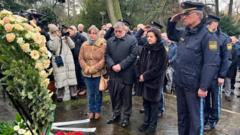A horrific knife attack in Bavaria has led to promises of stricter border controls from Friedrich Merz, the conservative opposition leader. Chancellor Olaf Scholz also condemned the attack, labeling it an "act of terror." This incident has reignited discussions about immigration policies and the growing influence of the far-right Alternative for Germany (AfD) party as the country approaches federal elections.
Rising Political Tensions Following Deadly Knife Attack in Germany

Rising Political Tensions Following Deadly Knife Attack in Germany
The recent knife attack in Aschaffenburg has sparked a fierce political debate in Germany about border controls and asylum policies, with significant implications for the upcoming elections.
A deadly knife attack targeting children in Aschaffenburg, Bavaria, has triggered heated political responses regarding Germany's immigration policies, particularly from Friedrich Merz, the conservative opposition leader poised to take charge in the upcoming federal elections. Following the tragic incident, which resulted in the deaths of a two-year-old boy of Moroccan descent and a 41-year-old man, Merz pledged significant reforms to border and asylum regulations, essentially proposing a closure of Germany's borders to irregular migrants, including those entitled to protection.
The Afghan suspect, a 28-year-old man involved in the attack, was previously linked to three instances of violence and had been living in asylum accommodations since arriving in Germany in 2022. Reports suggest he had consented to leave Germany prior to the attack but remained due to ongoing psychiatric treatment. Merz, whose Christian Democratic Union (CDU) is leading opinion polls ahead of the February 23 elections, asserted that on his first day in office, he would instruct the interior ministry to take over control of the country’s borders, criticizing the past decade of asylum policy as a failure.
Chancellor Olaf Scholz reacted swiftly to the stabbings, calling them an "act of terror," despite no evidence pointing to a terrorist motive. Scholz's comments reflect an intensified debate on immigration, which has become a pivotal issue as the far-right Alternative for Germany (AfD) is consistently gaining support by focusing on this topic.
Merz's approach parallels recent actions by US President Joe Biden concerning immigration. In the aftermath of the attack, AfD leader Alice Weidel urged immediate parliamentary action to strengthen border measures, claiming that such violence must lead to consequences.
Critics of Merz and Scholz argue their hardline stance may be politically motivated and could unintentionally bolster far-right narratives. German politics traditionally require coalition building, complicating any unilateral decisions from leaders who promise drastic changes. Notably, Christian Lindner, leader of the Free Democratic Party, remarked that if Merz allies with parties like the Social Democrats or the Greens, significant policy shifts would likely be impossible.
The knife attack also led to heroic recognition for the man who intervened, saving children from harm, highlighting the grave human cost of the incident. Meanwhile, a two-year-old girl of Syrian descent suffered serious injuries, underscoring the violent repercussions of the attack on the community.
In conclusion, as Germany navigates the aftermath of this tragedy, border control and asylum reform remain central to political discourse, with potential ramifications for the balance of power in the approaching elections. Advocates for humane policies caution against exploiting such events for political gain, warning of the rise of far-right tendencies in the political arena.



















